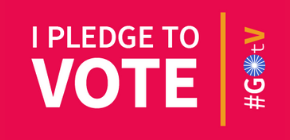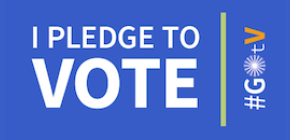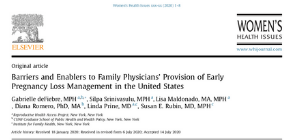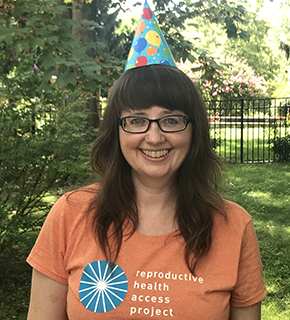Nov 06

Help Us Protect Access to Sexual and Reproductive Health Care Today!
The Reproductive Health Access Project is hosting monthly video chats to update our supporters and reconnect in a more personal way during this time of social distancing.
Please sign up here to attend one of our hour-long video chats. You’ll have a chance to meet some members of our team, learn about the work we do and hear about opportunities to get involved.
 This upcoming election won’t be like anything we’ve ever seen before. Its outcome will determine the future of our healthcare, our environment, our reproductive rights, and our democracy as a whole. It’s more vital than ever for us, therefore, to utilize the political power vested in us by democracy and vote. Here are a few tips to make sure that your vote gets where it’s supposed to and is counted on time.
This upcoming election won’t be like anything we’ve ever seen before. Its outcome will determine the future of our healthcare, our environment, our reproductive rights, and our democracy as a whole. It’s more vital than ever for us, therefore, to utilize the political power vested in us by democracy and vote. Here are a few tips to make sure that your vote gets where it’s supposed to and is counted on time.
If you’d like additional information, check out the ACLU’s Know Your Rights page, which walks you through the voting process and how to handle any potential problems that arise. This year, vote like your rights depend on it–because they do.
 Early pregnancy loss, also known as miscarriage, is one of those topics that does not get discussed as often or openly as it should. This is because there are a lot of myths and stigma surrounding early pregnancy loss. The stigma and myths serve only to make people facing an early pregnancy loss feel more alone. At RHAP we believe that every person and family facing an early pregnancy loss should have the facts about what is happening to their bodies, what their options are, and how common an experience this is.
Early pregnancy loss, also known as miscarriage, is one of those topics that does not get discussed as often or openly as it should. This is because there are a lot of myths and stigma surrounding early pregnancy loss. The stigma and myths serve only to make people facing an early pregnancy loss feel more alone. At RHAP we believe that every person and family facing an early pregnancy loss should have the facts about what is happening to their bodies, what their options are, and how common an experience this is.
Early pregnancy loss is fairly common, with about 1 in 4 pregnancies ending in early pregnancy loss. One of the myths that silences pregnant people is that their early pregnancy loss is their fault, something they did wrong. This is very rarely the case! When a pregnancy starts, cells divide fast to make an embryo, and sometimes errors occur. Your body notices this, and the pregnancy stops growing.
At RHAP, we work towards expanding access to high-quality, patient-centered care within each community. For many people who experience early pregnancy loss, they may think their only option is to be treated in the ER. However, family doctors and primary care clinicians can provide the care needed. This includes supporting a family to “watch and wait,” use medication, or have a procedure in the office. All three treatment options are safe, effective, often more affordable, and can take place in a familiar setting.
October 15 is Pregnancy and Infant Loss Remembrance Day. Knowing the myths around early pregnancy loss and creating space to discuss this stigmatized topic openly can be helpful, but this can still be a very difficult time. First Candle is a great resource for grieving families, and they have a toll-free 24/7 hotline for anyone to call: 1-800-221-7437. And, to learn more about early pregnancy loss, including all treatment options available, please check out our resources.
 Dr. Rebekah Rollston is a member of the Reproductive Health Access Network’s Massachusetts Cluster.
Dr. Rebekah Rollston is a member of the Reproductive Health Access Network’s Massachusetts Cluster.
November is just around the corner, and while in August we celebrated the centennial anniversary of the 19th Amendment granting white women the right to vote, we must also recognize the injustices that still pervade our country—in this case, it would be another 45 years before Black women were able to exercise that same right. Now, as we head into election season, reproductive health is at the forefront. Amidst many other health policies, we must consider contraceptive access… and its political determinants of health
Since Griswold v. Connecticut legalized the birth control pill for married women in 1965, contraception has been the subject of much political debate. In fact, it wasn’t until 1972 that the United States Supreme Court found that unmarried women had the same constitutional right to birth control as married women.
Fast-forward to July 2020, when the US Supreme Court upheld President Trump’s expansion of the religious and moral exemptions to the ACA’s 2011 contraceptive mandate in Little Sisters of the Poor v. Pennsylvania—the third time in six years that the Supreme Court has ruled on the contraceptive mandate. This case has left more than 70,000 people without access to free contraception. And not everyone is affected equally… Black, Latinx, and LGBTQ+ people are most impacted by these attacks on contraception.
As advocates for reproductive justice, we must ask ourselves: What truly shapes these health disparities? We must take one step past the social determinants of health to the root driver: the political determinants of health.
As advocates, clinicians, and leaders in our communities, it’s on us to draw this important connection between healthcare, health equity, and civic participation. We must vote. Clinicians must help their patients access their right to vote. And again, we must recognize that access to voting is not created equally. Voter suppression has a long history in the US, and this disproportionately affects our people of color and low-income people.
It’s time to get to work. Talk with your friends, colleagues, neighbors, and patients about the importance of voting, ask them about barriers, and find ways to help them overcome some of those barriers. In the midst of the COVID-19 pandemic, there will be lots of obstacles to voting this year. Get registered to vote and request a mail-in ballot here. And checkout the voter ID requirements for your state here.
And lastly, please vote in November! Contraceptive access, and so much more, depends on YOU.
 Over the past few years, RHAP has pursued a wide array of research to understand 1) the prevalence of early pregnancy loss (EPL) care offered in New York federally qualified health centers (FQHCs), 2) the barriers and enablers to providing EPL care, and 3) the effectiveness of our Miscarriage Care Initiative (MCI) to support primary care sites overcome barriers and integrate EPL care into practice. This year, all three studies have been accepted for publication into scientific journals! The second study is available to read now in the journal Women’s Health Issues.
Over the past few years, RHAP has pursued a wide array of research to understand 1) the prevalence of early pregnancy loss (EPL) care offered in New York federally qualified health centers (FQHCs), 2) the barriers and enablers to providing EPL care, and 3) the effectiveness of our Miscarriage Care Initiative (MCI) to support primary care sites overcome barriers and integrate EPL care into practice. This year, all three studies have been accepted for publication into scientific journals! The second study is available to read now in the journal Women’s Health Issues.
Here’s what we’ve learned.
In Provision of early pregnancy loss care in New York Federally Qualified Health Centers, we found that among 63 NY FQHCs that provide prenatal care:
In Barriers and enablers to family physicians’ provision of EPL management in the US, we explored this issue further by interviewing (n=15) and surveying (n=231) family physicians trained in early abortion care during residency. Of those surveyed, nearly all provided expectant management, 47.2% medication management, and 11.4% uterine aspiration for EPL. We found that:
Family physicians overwhelmingly believe that EPL care is a valuable and important component of family medicine. One explained:
“I don’t think that those sorts of conversations [about EPL] are able to happen as easily or tend to mean as much if they’re coming from a stranger, like a physician in the ER… To have somebody who knows [the patient] and can relate to [them] a little bit in terms of knowing [their] history, providing that reassurance and guidance… I think it means a lot to the patients we are providing services for.”
Overall, clinical training alone is insufficient to expand access to comprehensive EPL care in office-based settings. Supporting clinicians during and after residency with training and technical assistance to address barriers may expand access to comprehensive EPL care.
Lastly, in Evaluation of the Miscarriage Care Initiative, we sought to assess the effectiveness of RHAP’s MCI to increase comprehensive, patient-centered EPL care provision in primary care. We surveyed and interviewed nearly all MCI participants from 2013-2016 to learn about their experiences in the program.
Check out our article, Barriers and enablers to family physicians’ provision of early pregnancy loss management in the US, in Women’s Health Issues and stay tuned for our upcoming publications! Thanks to all of our amazing co-authors for making this research trifecta possible, especially Vicki Breitbart, Gabrielle deFiebre, Amanda Nagle, and Susan Rubin.
 The hard work of RHAP board members never goes unnoticed. Between Board meetings, writing personalized thank you notes to our supporters, and championing the work of RHAP, it is humbling to work alongside these folks. One of our board members, Emily Kane-Lee, is the most recent example of the Board’s commitment to RHAP’s mission and values.
The hard work of RHAP board members never goes unnoticed. Between Board meetings, writing personalized thank you notes to our supporters, and championing the work of RHAP, it is humbling to work alongside these folks. One of our board members, Emily Kane-Lee, is the most recent example of the Board’s commitment to RHAP’s mission and values.
“I wanted to do a fundraiser for my 40th birthday as an alternative way to bring my friends and family together during a time when we can’t be together in person (because of COVID). For me, the fundraiser was an opportunity to connect with the people in my life, who I wish I could give a big hug, and share a little bit about something that means so much to me: increasing access to full spectrum reproductive health care.
I am incredibly proud to support RHAP, especially now when the organization is wrestling with the hard questions of (1) how racism and white supremacy has shown up in our work, the reproductive health movement, and the American health care system and (2) what we are going to do about it. I wanted to share this important work with my community and ask them to support these hard conversations and RHAP’s critical mission.
I set the goal of $4,000 for two reasons: First, I really wanted to stick with the theme of turning 40, so 40 x 100 seemed appropriate and fun! Second, $4,000 is a pretty significant fundraising goal for an individual, but I knew my community was filled with generous spirits dedicated to improving the lives of others, and that we could meet the challenge if we came together. And we did!
While not everyone has the means right now to donate, support for RHAP was demonstrated is lots of different ways. I am truly humbled, although not surprised, that so many of my friends and family joined me in this effort.”
We applaud Emily for her commitment to immersing herself in this work beyond her role serving on the board of directors. Thank you for your endless support. If you’d like to start a birthday fundraiser for RHAP, fundraise in your community, workplace, or in other ways, email us here and start fundraising today!
Your gift allows us to train and support health care providers across the United States so they can offer patients compassionate and comprehensive care.
Nov 06
